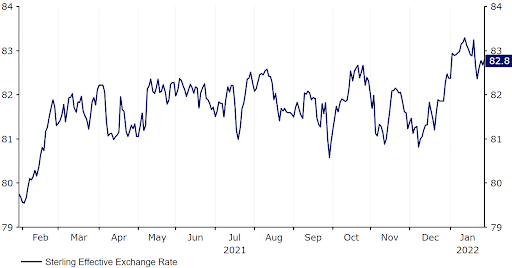BoE February Meeting Preview: Will the MPC raise rates again this week?
The Bank of England looks on course to raise interest rates for the second time in as many months on Thursday, as it continues its battle to rein in four decade high UK inflation.
Central Bank Meetings
The Bank of England looks on course to raise interest rates for the second time in as many months on Thursday, as it continues its battle to rein in four decade high UK inflation. The Monetary Policy Committee surprised investors in December by unexpectedly voting 8-1 in favour of raising rates by 15 basis points to 0.25%. In its statement, the MPC voiced fresh concerns over the recent increase in UK prices, noting that ‘consumer price inflation in advanced economies has risen by more than expected’. While the bank said that the impact of the omicron variant on inflation was unclear, it stated its view that inflation was set to peak at 6% in April, before easing during the remainder of the year. The surprise hike and hawkish assessment from the BoE lifted the pound to its strongest position in effective exchange rate terms since the Brexit vote in mid-January, although it has since retraced much of these gains (Figure 1). Figure 1: Sterling Effective Exchange Rate Index (2021 - 2022) Since the last MPC meeting, UK inflation has continued to surprise to the upside, driven largely by higher energy prices and ongoing supply-chain disruptions. Headline inflation rose to 5.4% in December, above the 5.1% expected and its highest level since March 1992 (Figure 2). The BoE will be releasing updated macroeconomic projections as part of its Monetary Policy Report this week, with an upward revision to the 2022 inflation forecast now likely, in our view. Concerns surrounding omicron have also eased in recent weeks, which should support the case for policy tightening. The December PMIs and retail sales data suggest that the impact of omicron on the UK economy has clearly been a non-negligible one, although the limited restrictions that were re-imposed over the New Year period have now been removed. Figure 2: UK Inflation Rate (2017 - 2021)
Since the last MPC meeting, UK inflation has continued to surprise to the upside, driven largely by higher energy prices and ongoing supply-chain disruptions. Headline inflation rose to 5.4% in December, above the 5.1% expected and its highest level since March 1992 (Figure 2). The BoE will be releasing updated macroeconomic projections as part of its Monetary Policy Report this week, with an upward revision to the 2022 inflation forecast now likely, in our view. Concerns surrounding omicron have also eased in recent weeks, which should support the case for policy tightening. The December PMIs and retail sales data suggest that the impact of omicron on the UK economy has clearly been a non-negligible one, although the limited restrictions that were re-imposed over the New Year period have now been removed. Figure 2: UK Inflation Rate (2017 - 2021) We think that the near unanimous decision to raise rates in December tells us two things. Firstly, the MPC is growing increasingly concerned with rising inflationary pressures and the impact of higher prices on the UK economy. A major concern for policymakers will be the continued surge higher in energy prices, which are expected to rise further should the government’s energy price cap increase as planned in April. While there is little the bank can do to stabilise energy costs or remedy supply constraints in the immediate-term, an aggressive pace of hikes would, at least, act to anchor inflation expectations and stave off a wage-price spiral. The second thing that the 8-1 vote tells us, is that policymakers do not appear unduly worried about the impact of omicron on the UK economy, nor do we believe that they should be. We would expect any slowdown in activity in December and January to prove limited and temporary in nature, and think that the growth outlook for this year remains a rather encouraging one.
We think that the near unanimous decision to raise rates in December tells us two things. Firstly, the MPC is growing increasingly concerned with rising inflationary pressures and the impact of higher prices on the UK economy. A major concern for policymakers will be the continued surge higher in energy prices, which are expected to rise further should the government’s energy price cap increase as planned in April. While there is little the bank can do to stabilise energy costs or remedy supply constraints in the immediate-term, an aggressive pace of hikes would, at least, act to anchor inflation expectations and stave off a wage-price spiral. The second thing that the 8-1 vote tells us, is that policymakers do not appear unduly worried about the impact of omicron on the UK economy, nor do we believe that they should be. We would expect any slowdown in activity in December and January to prove limited and temporary in nature, and think that the growth outlook for this year remains a rather encouraging one. 
 Since the last MPC meeting, UK inflation has continued to surprise to the upside, driven largely by higher energy prices and ongoing supply-chain disruptions. Headline inflation rose to 5.4% in December, above the 5.1% expected and its highest level since March 1992 (Figure 2). The BoE will be releasing updated macroeconomic projections as part of its Monetary Policy Report this week, with an upward revision to the 2022 inflation forecast now likely, in our view. Concerns surrounding omicron have also eased in recent weeks, which should support the case for policy tightening. The December PMIs and retail sales data suggest that the impact of omicron on the UK economy has clearly been a non-negligible one, although the limited restrictions that were re-imposed over the New Year period have now been removed. Figure 2: UK Inflation Rate (2017 - 2021)
Since the last MPC meeting, UK inflation has continued to surprise to the upside, driven largely by higher energy prices and ongoing supply-chain disruptions. Headline inflation rose to 5.4% in December, above the 5.1% expected and its highest level since March 1992 (Figure 2). The BoE will be releasing updated macroeconomic projections as part of its Monetary Policy Report this week, with an upward revision to the 2022 inflation forecast now likely, in our view. Concerns surrounding omicron have also eased in recent weeks, which should support the case for policy tightening. The December PMIs and retail sales data suggest that the impact of omicron on the UK economy has clearly been a non-negligible one, although the limited restrictions that were re-imposed over the New Year period have now been removed. Figure 2: UK Inflation Rate (2017 - 2021) We think that the near unanimous decision to raise rates in December tells us two things. Firstly, the MPC is growing increasingly concerned with rising inflationary pressures and the impact of higher prices on the UK economy. A major concern for policymakers will be the continued surge higher in energy prices, which are expected to rise further should the government’s energy price cap increase as planned in April. While there is little the bank can do to stabilise energy costs or remedy supply constraints in the immediate-term, an aggressive pace of hikes would, at least, act to anchor inflation expectations and stave off a wage-price spiral. The second thing that the 8-1 vote tells us, is that policymakers do not appear unduly worried about the impact of omicron on the UK economy, nor do we believe that they should be. We would expect any slowdown in activity in December and January to prove limited and temporary in nature, and think that the growth outlook for this year remains a rather encouraging one.
We think that the near unanimous decision to raise rates in December tells us two things. Firstly, the MPC is growing increasingly concerned with rising inflationary pressures and the impact of higher prices on the UK economy. A major concern for policymakers will be the continued surge higher in energy prices, which are expected to rise further should the government’s energy price cap increase as planned in April. While there is little the bank can do to stabilise energy costs or remedy supply constraints in the immediate-term, an aggressive pace of hikes would, at least, act to anchor inflation expectations and stave off a wage-price spiral. The second thing that the 8-1 vote tells us, is that policymakers do not appear unduly worried about the impact of omicron on the UK economy, nor do we believe that they should be. We would expect any slowdown in activity in December and January to prove limited and temporary in nature, and think that the growth outlook for this year remains a rather encouraging one. 





